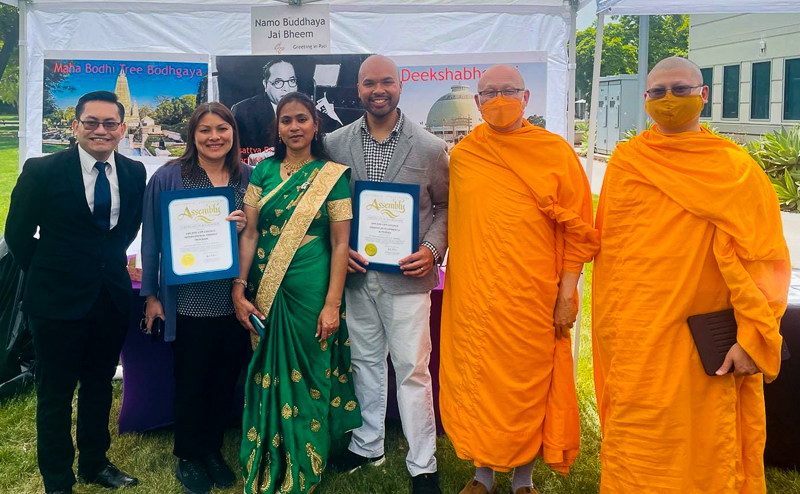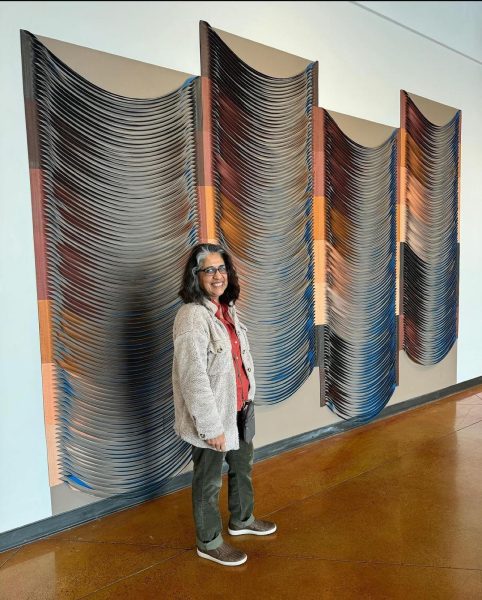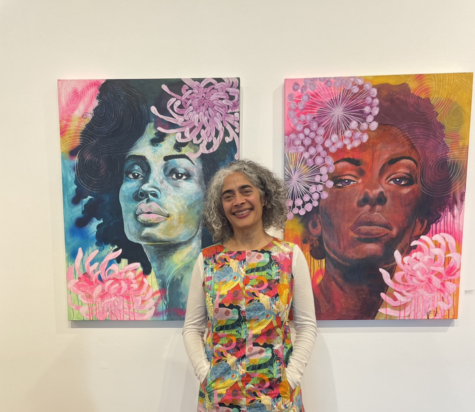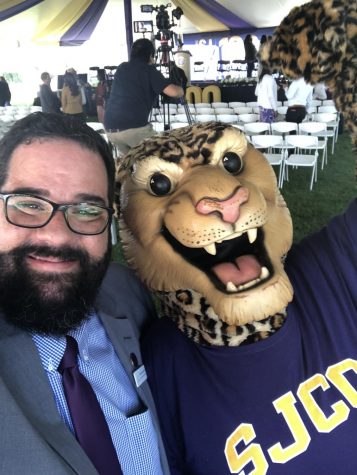Humanitarian improved the lives of India’s downtrodden
Photo contributed by Aruna Masoorkar
SJCC celebrated the 131st birthday of Indian humanitarian Dr. Bheemrao Ramjee Ambedkar on April 14. Pictured from left: Field representative of assembly member Ash Kalra, Tuan Nguyen; International Program Director Doriann Tran; SJCC student Aruna Masoorkar; committee ambassador, Blake Balahadia; Director of student activity and development, Venerable Manikanto Bhikku-Abbott of Dhammakaya Meditation Center, Morgan Hill; and Venerable Pattanai Dhammadhiro.
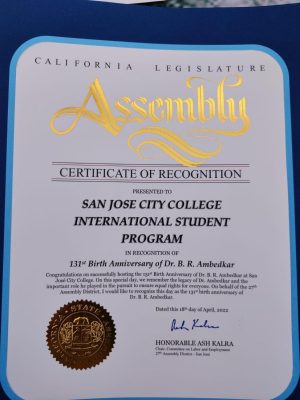
Bodhisattva Dr. Bheemrao Ramjee Ambedkar was born on April 14, 1891, in Mahu, Madhya Pradesh, India, and was referred to as an Untouchable in Hindu.
According to Hindu, the religion’s caste system, humans are divided into four levels: Brahmins, Kshatriyas, Vaishyas and the fourth level was “Untouchables”, or downtrodden, which had lower status than animals.
His father was a subedar in the British army so he was allowed to go to school, except that he had to sit outside the classroom on the ground and was not allowed to drink the water from the common pot.
The teacher did not touch Ambedkar’s notebook, afraid that he would become impure so he used to see it from a distance.
Yet Ambedkar solved and answered all the questions before the teacher could do it.
The downtrodden were not permitted to carry umbrellas, wear shoes, gold ornaments or go into town because if their shadow fell upon a Brahmin, it would pollute him.
They were required while walking through streets in towns to tie a broom around their waist to clear their footprints. Otherwise if a hindu walks on it, he will become impure.
The downtrodden had to hang an earthen pot around their neck to hold their spittle. They might not spit on the ground in case a Hindu should be polluted by touching it with his foot. Women were compelled not to wear blouses.
As a child, he used to think that when the sun, moon, earth and nature do not discriminate among all human beings then why do these people ill-treat us?
What is our fault? We look the same, then why we are referred to as Untouchables. He decided to find the solution to humankind and make equal rules for everyone. This is possible by pursuing higher education.
Ambedkar completed a Bachelor of Art degree from Elphinstone College, Bombay, University of Bombay, in 1912.
In 1915 he received a master’s degree in Economics with sociology, history, philosophy, anthropology.
In 1917 he was the first Asian to obtain a postdoctoral degree from Columbia University, and in 1921 he got a Master of Science from the London School of Economics.
During this period he lost his two sons, one daughter and his beloved wife. He was completely shattered, but he did not give up the passion to uplift his community.
The downtrodden were not allowed to drink the water from the same pond, which people from other three levels could drink. However, dogs and other animals were allowed to drink there.
By leading the group of this community, Ambedkar said, “We are not going to the Chavdar tank to merely drink its water. We are going to the tank to assert that we, too, are human beings like others. It must be clear that this meeting has been called to set up the norm of equality.”
He was the first law minister of independent India and the chief architect of the Indian constitution.
In 1951 Ambedkar established the Finance Commission of India, opposing income tax for low-income groups. Ambedkar resigned from his post as the first law minister of India when the Comprehensive Hindu Code Bill was dropped by the Indian Parliament.
The bill had two main purposes: To elevate the social status of Hindu women by giving them their due rights and to abolish social disparities and caste inequalities.
Some of the key features of this bill were: Women could now inherit family property, divorce and adopt girls. The code gave both men and women the right to divorce if the marriage was untenable. Widows and divorcees were given the right to remarry. Polygamy was outlawed.
As a member for labor in the viceroy’s council from 1942 to 1946, Ambedkar was instrumental in bringing about several labor reforms.
He changed the working hours from 12 hours to eight hours in the seventh session of the Indian Labor Conference in New Delhi, November 27, 1942. He also introduced several measures for workers such as dearness allowance, leave benefit, employee insurance, medical leave, equal pay for equal work, minimum wage and periodic revision of scale of pay.
Ambedkar also strengthened trade unions and established employment exchanges across India.
“He framed many laws for women workers in India such as the Mines Maternity Benefit Act, Women Labor Welfare Fund, Women and Child Labor Protection Act, Maternity Benefit for Women Labor and Restoration of Ban on Employment of Women on Underground Work in Coal Mines,” said Vipin Bhartiya, Aruna Masoorkar’s friend in India.
He received awards and honors of Bodhisattva in 1956, Bharat Ratna in 1990, First Colombian Ahead of Their Time in 2004 and The Greatest Indian in 2012.
On October 14th, 1956, he embraced Buddhism, the Buddhist monk who converted Babasaheb Ambedkar to Buddhism called him the modern Buddha of this age.
His quote:
“Freedom of mind is the real freedom. A person whose mind is not free, though he may not be in chains, is a slave, not a free man. One whose mind is not free, though he may not be in prison, is a prisoner and not a free man. One whose mind is not free though alive is no better than dead. Freedom of mind is the proof of one’s existence.”
“I measure the progress of a community with the degree of progress women have achieved.”
Aruna Masoorkar is an SJCC international student. She is a committee ambassador for the Equity and Achievement Program as well as a math tutor.
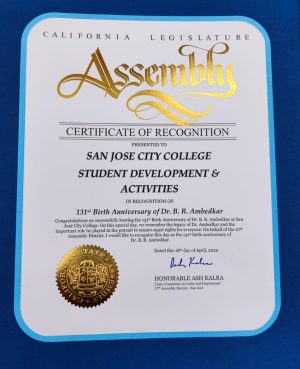
Note: The article was edited by the editor-in-chief of the Times on May 4 for the contribution of a source.
Note: The article was edited by the editor-in-chief of the Times on May 11.
Your donation will support the student journalists of San Jose City College. Your contribution will allow us to purchase equipment and cover our annual website hosting costs.

